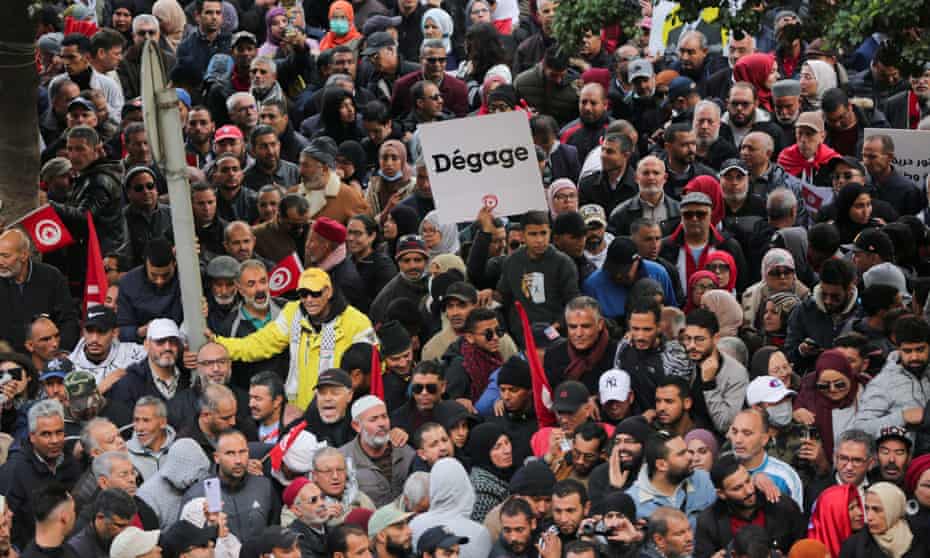
Demonstrators on Saturday demanded Kais Saied step down as they marked the anniversary of 2011 revolution
Thousands of protesters in central Tunis have marched against the seizure of near total power by the Tunisian president, Kais Saied, demanding he step down as they marked the anniversary of a key date in the 2011 revolution that brought democracy.
The central Habib Bourguiba avenue, the traditional site for major demonstrations, was crowded with thousands of protesters waving Tunisian flags, amid chants of “the people demand the fall of the regime”.
A heavy police presence remained outside the interior ministry building on the street, along with water cannon.
“Tunisia is going through the most dangerous time in its history. Saied took control of all authority and struck at democracy. The economy is collapsing. We will not be silent,” said Said Anouar Ali, a 34-year-old demonstrator.
Protesters had pushed past police and metal barricades to reach the avenue, defying initial efforts by the authorities to keep separate several parallel protests that had been called by different political parties and civil society organisations.
“We were on Bourguiba in January 2011 when Saied was not present … today, he is closing Bourguiba to us. We will reach it whatever the price,” said Chaima Issa, an activist who took part in the 2011 revolution before the crowd pushed through the barriers.
Another major opposition political party, aligned with the pre-revolution autocracy, held a separate rally in central Tunis after it was banned from marching near the presidential palace in Carthage.
Saied shut down the elected parliament in 2021 and began to reshape the political system, but low turnout for December’s election of a new, mostly powerless, legislature revealed little public appetite for his changes.
Meanwhile, the economy is failing, with staple goods disappearing from shelves, and the government has not yet been able to secure an international bailout with state finances facing bankruptcy.
The main political forces, including most parties and the labour union, oppose Saied’s project, with many of them calling it an anti-democratic coup.
However, they have failed to repair deep ideological and personal fissures that divided them for years rather than forming a united front.
Many parties still reject a role for the biggest party, the Islamist Ennahda. The powerful UGTT labour union seeks a national dialogue but will not invite any party that accuses Saied of a coup.
The protests come 12 years to the day after the ousting of former autocrat, Zine El Abidine Ben Ali, and 14 January is seen by most Tunisian parties and civil society groups as the anniversary of the revolution.
However, Saied unilaterally changed the official anniversary date and has said he regards 14 January as a moment when the revolution went astray.
While there has been no major crackdown on opponents of Saied, and police have allowed most protests against him, their handling of demonstrations on 14 January last year was more forceful, prompting condemnation from rights activists.
… we have a small favour to ask. Millions are turning to the Guardian for open, independent, quality news every day, and readers in 180 countries around the world now support us financially.
We believe everyone deserves access to information that’s grounded in science and truth, and analysis rooted in authority and integrity. That’s why we made a different choice: to keep our reporting open for all readers, regardless of where they live or what they can afford to pay. This means more people can be better informed, united, and inspired to take meaningful action.
In these perilous times, a truth-seeking global news organisation like the Guardian is essential. We have no shareholders or billionaire owner, meaning our journalism is free from commercial and political influence – this makes us different. When it’s never been more important, our independence allows us to fearlessly investigate, challenge and expose those in power. Support the Guardian from as little as $1 – it only takes a minute. If you can, please consider supporting us with a regular amount each month. Thank you.




